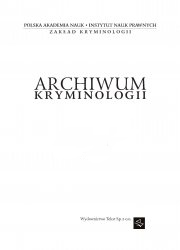The pandemic as an antidote to populism: Punishment, immobilisation, and COVID-19
The pandemic as an antidote to populism: Punishment, immobilisation, and COVID-19
Author(s): John Pratt, Daisy LutyensSubject(s): Security and defense, Criminology, Health and medicine and law, Penal Policy
Published by: Instytut Nauk Prawnych PAN
Keywords: populism; COVID-19; immobilisation; punishment; security;
Summary/Abstract: The contemporary rise of populism across much of Western society – especially the Anglosphere countries that are the main focus of this article – has threatened many of the protections and freedoms provided by the post-1945 commitment to a democratic political order: guarantees of human rights, adherence to the rule of law, and a media that is free to criticise governments and hold them to account. Populism has also come to be associated with a very different penal programme from that which, for several decades after 1945, characterised a given society’s commitment to democracy. That pattern of justice – largely based on reason, liberalism, and expert knowledge – was significant beyond its operational boundaries. It symbolised the Western democratic order, standing out as a beacon of humanity against totalitarianism. The rise of populism, however, has helped to fashion a very different penal programme, associated with historic rises in imprisonment levels and the immobilisation of those who pose risks to public well-being – even if, in so doing, the foundations of criminal justice in the democratic world are undermined by the strategies employed. It might thus be supposed that governmental reactions to the COVID-19 pandemic pose a further threat to democracy and its criminal justice processes. Additional forms of immobilisation have been introduced to combat the spread of the virus: restrictions on freedom of movement in public spaces or stay-at-home orders equivalent to house arrest – controls which now cover entire nations rather than just individuals at risk of committing particular crimes. As such, this kind of ‘rule by decree’ might seem to be a blueprint for would-be autocrats wishing to subvert democratic processes and forms of accountability altogether. However, the article also argues that the pandemic provides very different possibilities of governance to populist authoritarianism. Indeed, the virus acts as an antidote to populism. COVID-19 has laughed in the face of populist demagogues. It shows them to be nothing more than incompetent, though usually malevolent, charlatans with some of the world’s highest infection and fatality rates in their societies. Instead of their empty populist blustering, the pandemic can only be eliminated by science and expert knowledge, acting in conjunction with a strong but accountable central government amidst forms of immobilisation to which the general public have largely acquiesced – strengthening rather than weakening social cohesion in the process in many instances. As the virus has eaten into the support for populism, the dangers which the latter posed to democratic order have also been pushed back. Previous pandemics have been followed by dramatic social and economic changes. Such changes post-COVID-19 may now sever the links between populism and penal development, allowing for a different and more restricted penal framework.
Journal: Archiwum Kryminologii
- Issue Year: 1/2022
- Issue No: XLIV
- Page Range: 283-311
- Page Count: 29
- Language: English

